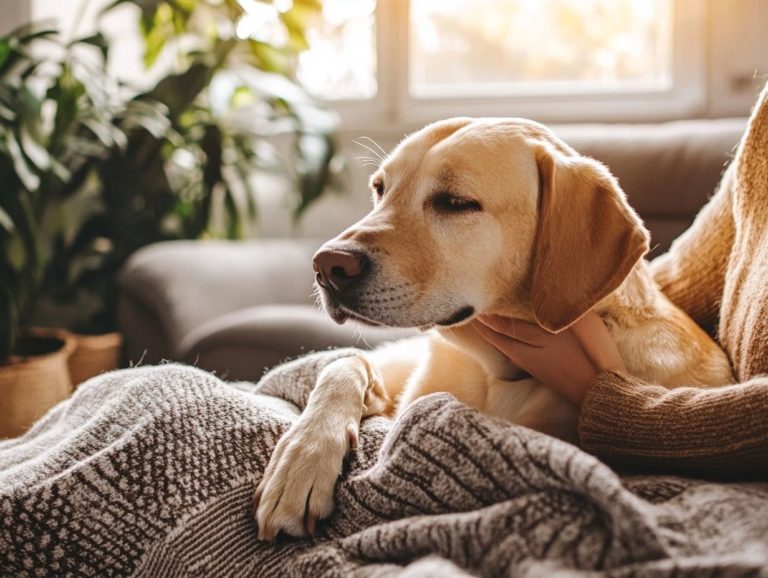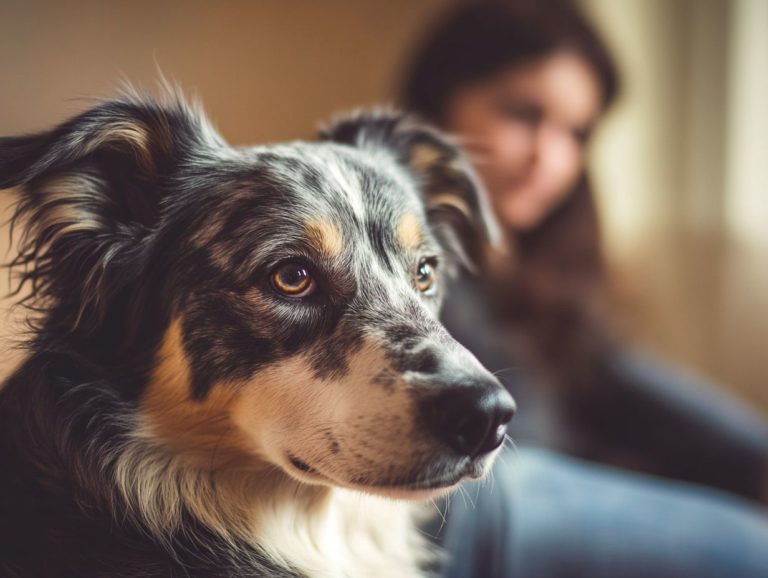Understanding the Role of Diet in Pet Anxiety
Pet anxiety is becoming an increasingly pressing issue for pet owners. Many might not realize just how much diet can impact their furry companions’ mental health. Let s dive into the essential connection between diet and pet anxiety, shedding light on common stressors, crucial nutrients, and dietary strategies that can significantly alleviate anxiety.
We will cover valuable supplements, offer tips for crafting a balanced diet, and examine other lifestyle elements that play a role in your pet s overall well-being. You will also discover how simple dietary adjustments can pave the way for a happier, calmer pet.
Contents
- Key Takeaways:
- The Connection Between Diet and Pet Anxiety
- Common Triggers of Pet Anxiety
- Types of Diets for Reducing Anxiety
- Supplements and Medications for Pet Anxiety
- Creating a Balanced Diet for Anxious Pets
- Key Elements to Tackle Pet Anxiety
- Frequently Asked Questions
- What is pet anxiety and how does it relate to diet?
- What types of diets are beneficial for pets with anxiety?
- Can certain foods make pet anxiety worse?
- Are there any natural remedies for pet anxiety?
- Is there a specific diet plan for managing pet anxiety?
- Can changing my pet’s diet completely cure their anxiety?
Key Takeaways:
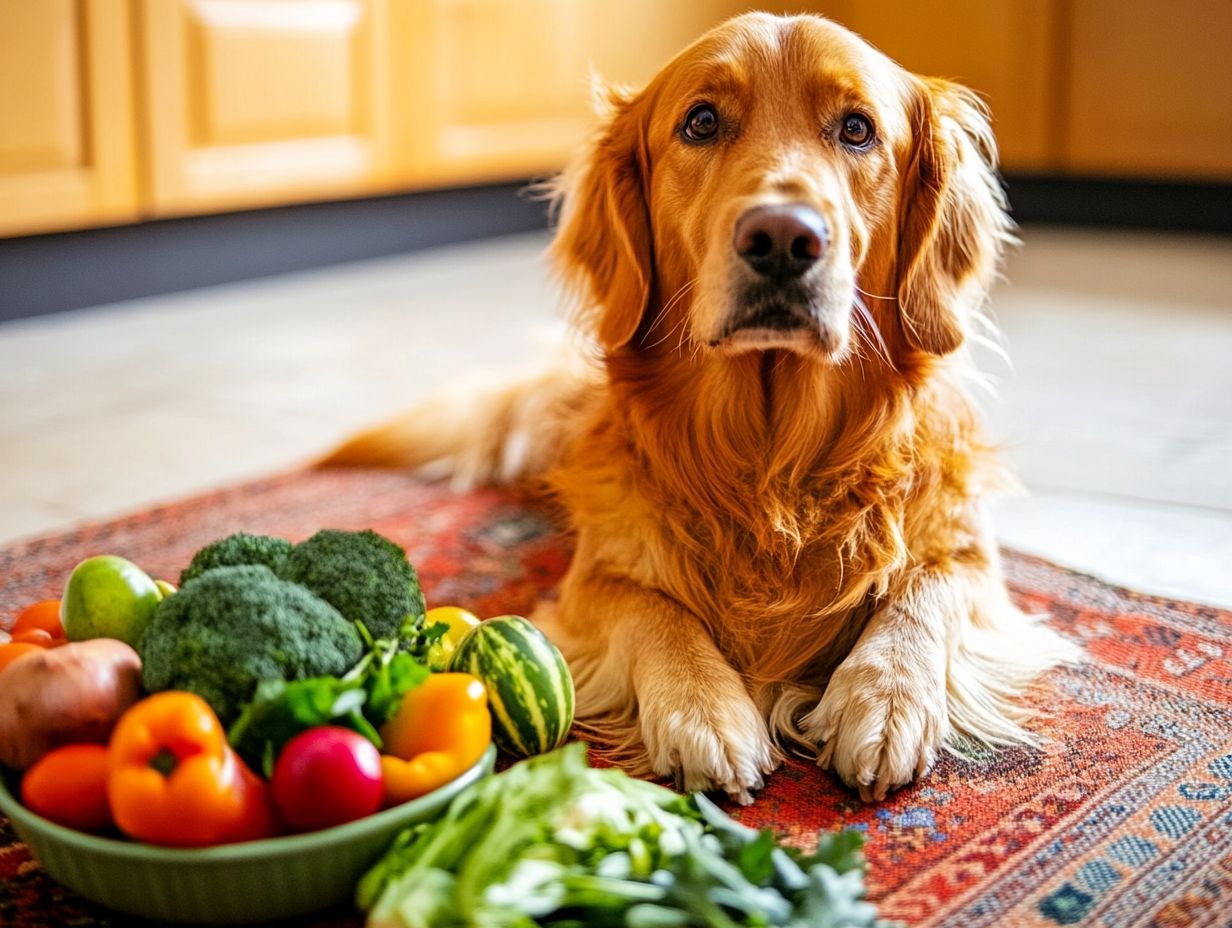
- A balanced diet is crucial for managing pet anxiety by providing necessary nutrients and reducing potential triggers.
- Identify stressors specific to your pet to create the most effective diet plan for reducing anxiety.
- Incorporate healthy foods, supplements, and maintain a consistent routine to create a calming and anxiety-free environment for your pet.
The Connection Between Diet and Pet Anxiety
The intricate connection between diet and pet anxiety reveals just how much a balanced diet can influence your furry friend’s mental health. Just like humans, pets can experience anxiety, depression, and stress, often swayed by what they eat. Additionally, understanding the role of routine in pet anxiety management can also be beneficial in alleviating these issues.
Understanding the relationship between what they eat and behavioral changes is essential for promoting overall well-being. By incorporating the right food sources, like omega-3 fatty acids and essential nutrients, you can help ease signs of anxiety in your canine companion.
This article explores how diet serves as a pivotal factor in alleviating pet anxiety.
How Diet Impacts Mental Health in Pets
Diet plays a pivotal role in shaping the mental health of your pets, especially dogs, by influencing their behavioral responses and overall well-being.
Incorporating specific dietary components can significantly enhance their emotional stability and reduce anxiety levels. For example, omega-3 fatty acids, commonly found in fish like salmon and sardines, are renowned for supporting brain health and improving mood. Antioxidants from blueberries and leafy greens protect against cellular stress, while amino acids from proteins like chicken and beef are essential for producing chemicals in the brain that help regulate feelings.
By thoughtfully selecting foods rich in these nutrients, you can create a balanced diet that not only nourishes but also soothes your furry companions.
Common Triggers of Pet Anxiety
Understanding common triggers of pet anxiety is essential for any pet owner wanting to support their furry companion in navigating stress and behavioral changes.
Factors such as loud noises, unfamiliar surroundings, and shifts in routine can heighten anxiety in dogs. By being aware of these triggers, you can identify and effectively mitigate these stressors, ultimately enhancing your canine friend’s well-being.
Identifying Stressors in Pets
Identifying stressors in your pets, particularly dogs, is essential for crafting effective strategies to manage their anxiety levels.
Understanding the root causes of their distress gives you the power to create a more harmonious environment for them. One effective method is to closely observe any behavioral changes: increased barking, withdrawal, or excessive grooming may signal underlying stress. Environmental factors such as loud noises, unfamiliar visitors, or shifts in routine can significantly affect your pet’s well-being.
Engaging with a pet nutritionist can also prove beneficial, as a well-balanced diet plays a vital role in their mental health. Seeking advice from a veterinarian allows for a comprehensive assessment, ensuring that the emotional and physical needs of your furry companions are thoroughly addressed.
Types of Diets for Reducing Anxiety
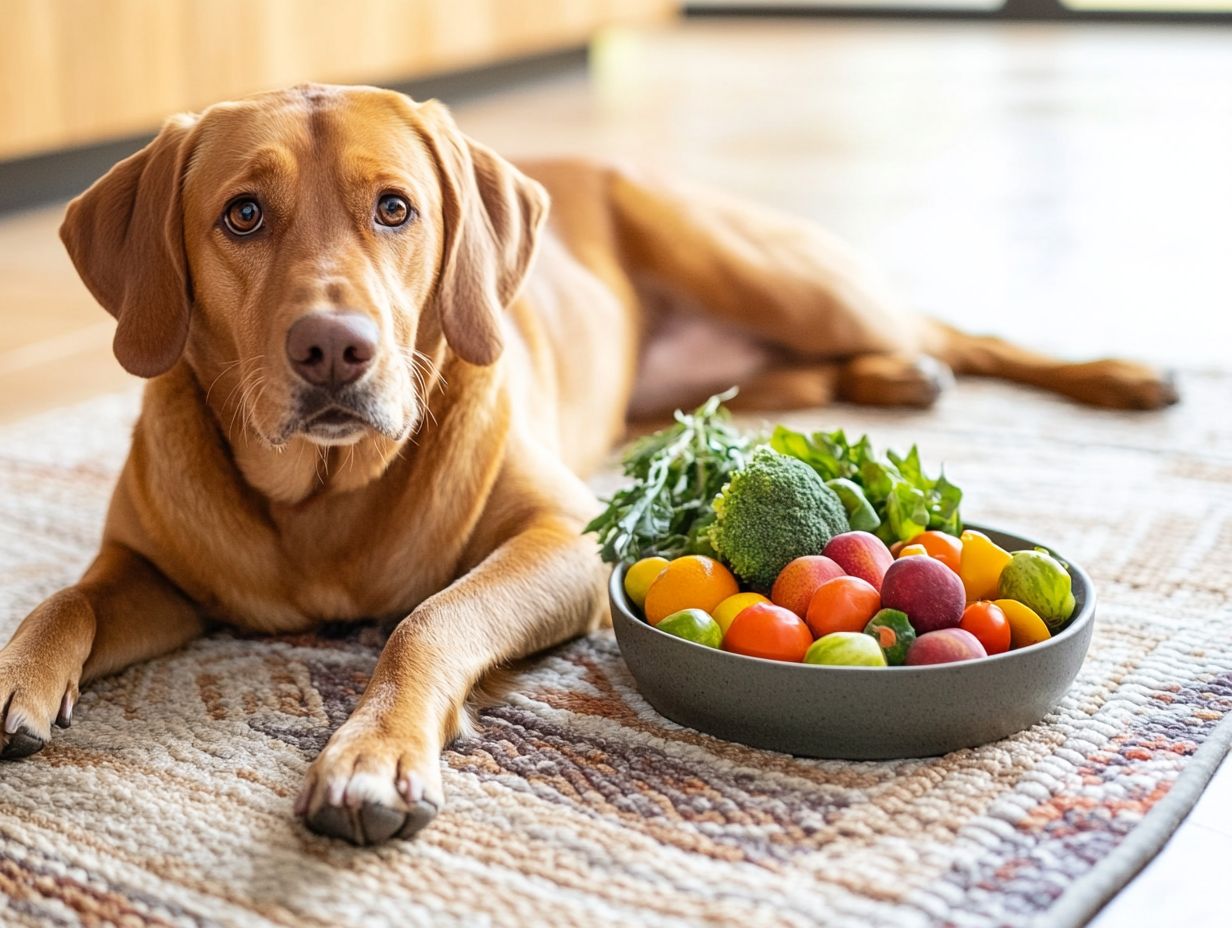
Exploring different diets aimed at reducing anxiety can offer you actionable strategies to enhance your dog’s mental well-being. A raw feeding diet is becoming increasingly popular, emphasizing natural food sources that deliver essential nutrients and healthy fats.
A balanced diet that includes ingredients like salmon and sweet potatoes can also play a significant role in alleviating anxiety while boosting overall health.
In this section, you’ll discover the most effective dietary approaches to support your anxious pets.
Recommended Nutrients and Ingredients
When creating a diet tailored to reducing anxiety in your pets, several key nutrients and ingredients emerge as champions for their mental health benefits, as outlined in understanding pet anxiety.
Among these, omega-3 fatty acids truly shine for their remarkable ability to support brain function and lower stress levels. Add these essential fats to your pet’s meals; you ll find them in fatty fish like salmon and sardines, as well as in flaxseeds and walnuts. Doing so can significantly lift their spirits and promote emotional stability.
Equally vital are the B vitamins, which maintain optimal brain health. Sources such as chicken, eggs, and leafy greens help keep your pet s mind sharp and vibrant.
Don t overlook magnesium found in pumpkin seeds and spinach which plays a key role in regulating neurotransmitters linked to relaxation and anxiety reduction. Additionally, zinc, abundant in shellfish, meat, and legumes, supports cognitive function, making it essential for maintaining emotional balance in your furry companions.
Supplements and Medications for Pet Anxiety
When dietary adjustments fall short, exploring supplements and medications for pet anxiety can be a wise choice for discerning pet owners. Numerous products are specifically crafted to foster calmness and ease anxiety in dogs, including L-Tryptophan, a natural substance that helps boost mood.
Act quickly if you see signs of anxiety in your pet; recognizing the right moments to consider these alternative treatments can profoundly enhance your pet’s quality of life.
When to Consider Alternative Treatments
Identifying the right moment to explore alternative treatments for your pet s anxiety is crucial for ensuring their well-being.
Pay attention to subtle behavioral changes, such as increased barking, destructive habits, or a tendency to withdraw from social interactions. These can be key indicators that your current management strategy might not be effective.
In such situations, consider looking into holistic options. Discussing specific medications with your veterinarian may also help. Supplements containing ingredients like chamomile or L-theanine can enhance traditional therapies by promoting relaxation, while prescription medications may provide essential support during particularly stressful times.
Together, these options can create a balanced approach tailored to meet the unique needs of your anxious companion.
Creating a Balanced Diet for Anxious Pets
Crafting a balanced diet for your anxious pets is essential for fostering their overall well-being and alleviating anxiety. This means carefully choosing the right blend of nutrients while ensuring the food is appealing and tailored to their specific needs.
Engaging with a pet nutritionist can offer valuable insights into integrating wholesome foods that help stabilize hormone levels and diminish stress responses. By taking these steps, you can significantly enhance the quality of life for your beloved canine companions.
Tips for Incorporating Healthy Foods into Your Pet’s Diet
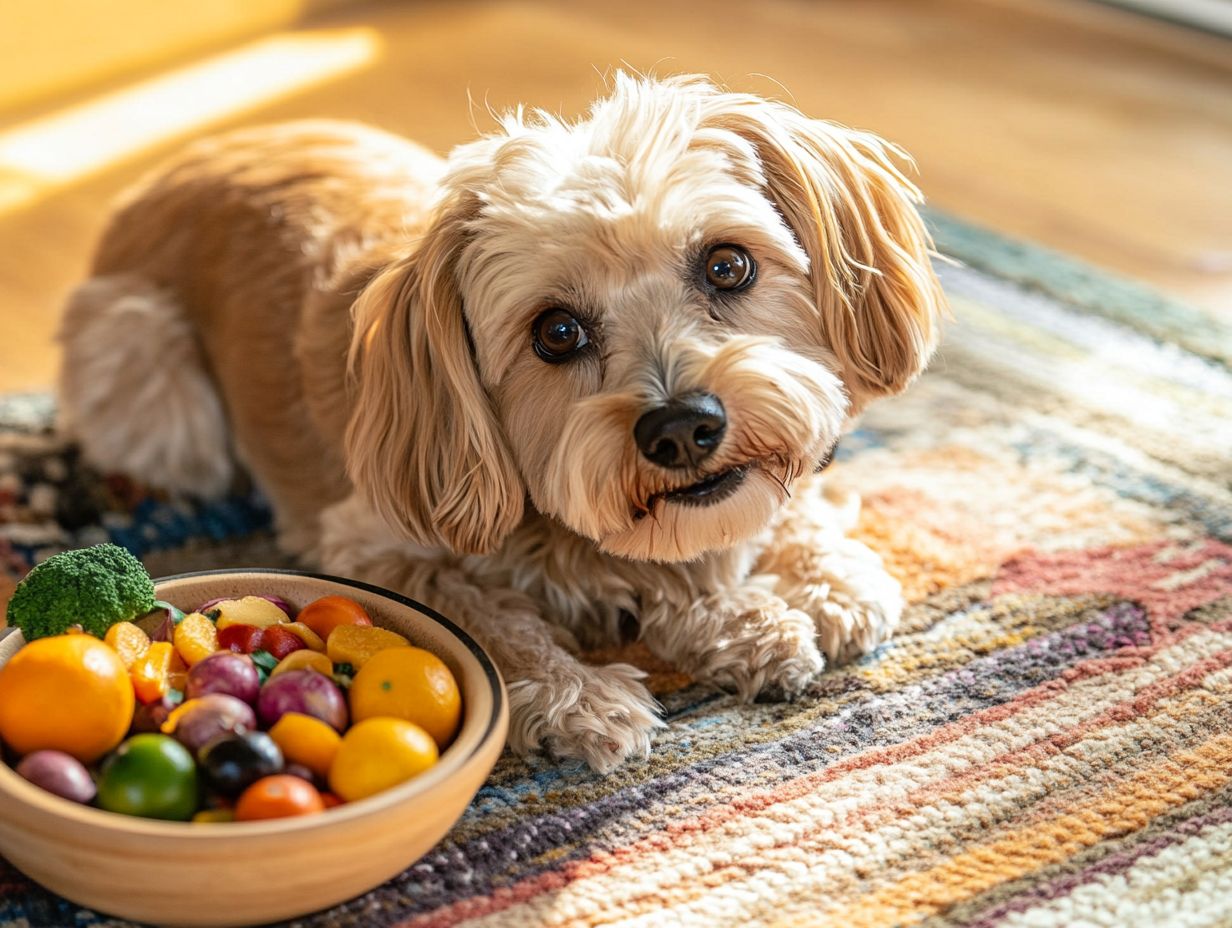
Incorporating healthy foods into your pet’s diet is crucial for their mental health and can help alleviate anxiety. By prioritizing nourishing ingredients, you can see a significant improvement in your furry companion’s overall well-being.
When considering raw meat options, it s essential to source them from reputable suppliers to minimize potential health risks. Prepare these meals with balance in mind, adding vegetables and supplements to ensure they receive all the necessary nutrients.
Transitioning to a new diet should be gradual. Mix small amounts of the new food with their favorite foods to avoid stomach upset and help your pet adjust comfortably to their new meal plan.
Key Elements to Tackle Pet Anxiety
Managing your pet’s anxiety involves an overall plan that goes beyond dietary choices. It includes essential aspects such as exercise, environment, and routine.
Establishing a stable environment and ensuring regular physical activity can uplift your dog’s mood while reducing anxiety and stress. Embracing a holistic approach fosters a more secure and tranquil atmosphere for your beloved companion.
Exercise, Environment, and Routine
Exercise, environment, and routine profoundly influence your pet’s anxiety management.
These three factors work together to create a balanced lifestyle that fosters a sense of security and engagement for your pet. Ensuring adequate physical activity not only releases pent-up energy but also stimulates their mind.
You can achieve this through regular walks, interactive play sessions, or even agility training that keeps them mentally sharp.
Your living environment should serve as a safe haven for your pet. Enhance it by providing cozy spaces, enriching toys, and sensory stimuli to help alleviate stress.
Establishing consistent daily routines like feeding, playtime, and quiet moments promotes predictability, allowing your pet to feel more at ease.
Frequently Asked Questions
What is pet anxiety and how does it relate to diet?
Pet anxiety is a mental health disorder affecting many animals, including cats and dogs. Diet plays a crucial role in managing pet anxiety, as certain nutrients can exacerbate or alleviate symptoms.
What types of diets are beneficial for pets with anxiety?
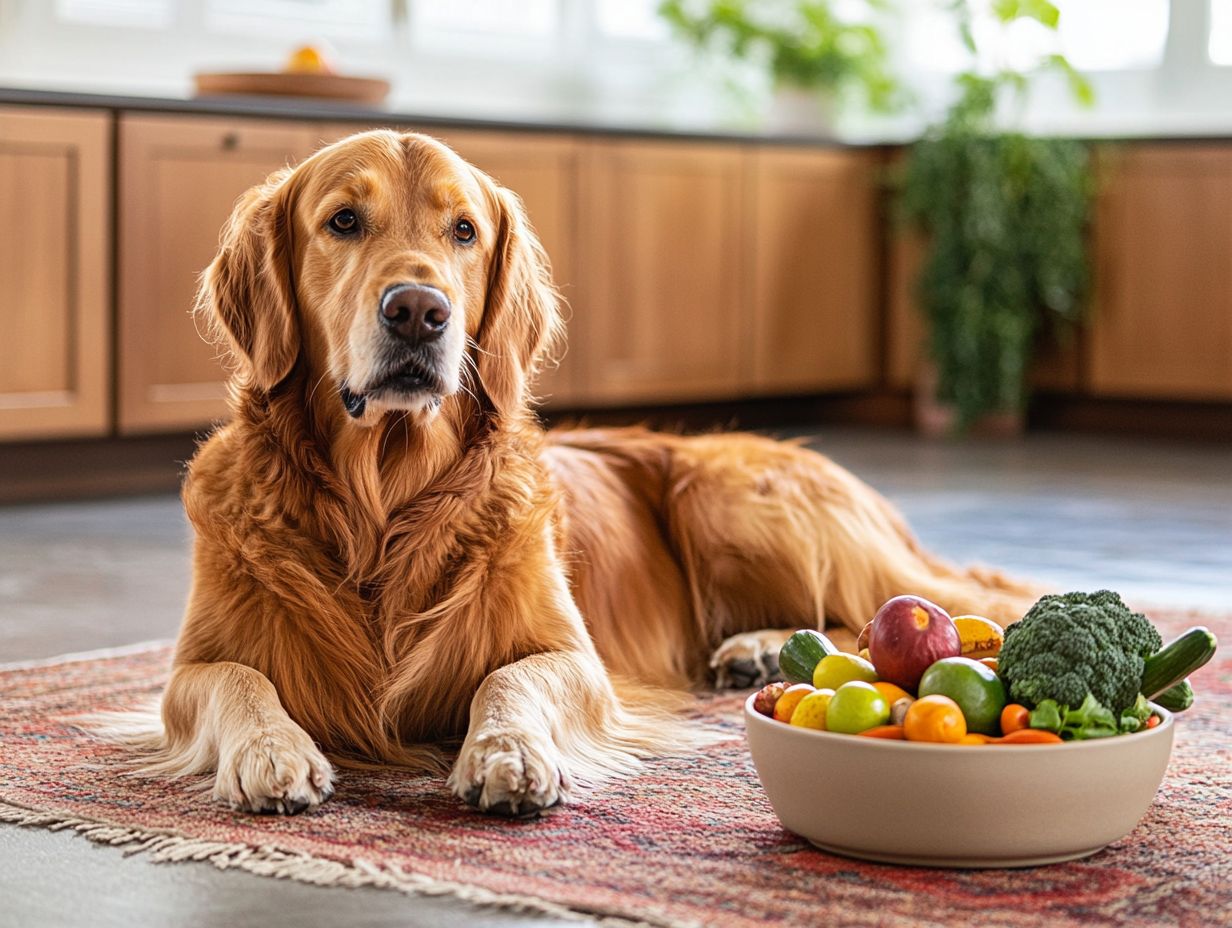
Diets high in omega-3 fatty acids, antioxidants, and B vitamins are beneficial for pets with anxiety. These nutrients have calming effects on the brain and can help reduce anxiety symptoms.
Can certain foods make pet anxiety worse?
Yes, certain foods can trigger or worsen pet anxiety. Foods high in sugar, carbohydrates, and artificial ingredients are linked to increased anxiety in pets.
Are there any natural remedies for pet anxiety?
Yes, natural remedies may help alleviate pet anxiety. Supplements like chamomile and valerian, along with herbal remedies like lavender and passionflower, can be beneficial. Always consult with a veterinarian before trying any natural remedies.
Is there a specific diet plan for managing pet anxiety?
There isn’t a one-size-fits-all diet plan for managing pet anxiety. Each pet has different nutritional needs, so it s important to consult with a veterinarian or pet nutritionist to develop a tailored diet plan.
Can changing my pet’s diet completely cure their anxiety?
No, while diet significantly impacts pet anxiety, it is not a cure. Other factors such as environment, exercise, and training also need to be addressed. Always consult with a veterinarian for the best treatment plan for your pet’s needs.
Don’t wait start incorporating healthy foods today and see the difference in your pet’s mood!

